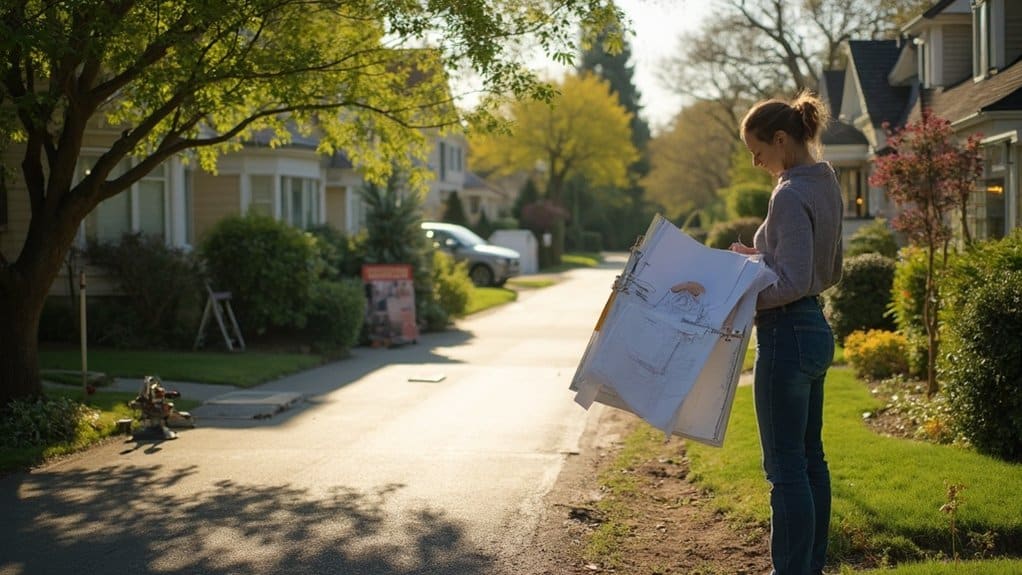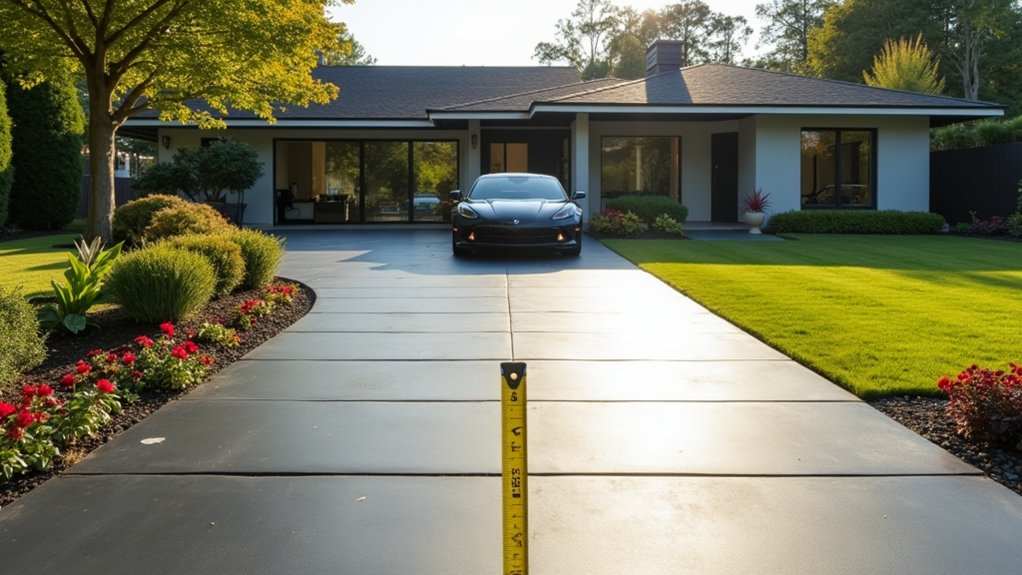You will likely need planning permission for a driveway extension, particularly if you’re changing access points or using non-permeable materials. Planning regulations can differ, especially in conservation areas, where any new access or modifications usually require approval. Even if you opt for permeable surfaces, it’s wise to check local guidelines. For clarity on your specific situation, consult your local planning authority. It’s important to consider all relevant factors and rules.
Table of Contents
ToggleKey Takeaways
Do You Need Planning Permission for a Driveway Extension?
- Planning permission is generally necessary if you’re widening your driveway or changing access points, especially for new entrances onto public roads.
- If your driveway will cover more than five square metres with a non-permeable surface, you’ll likely need planning permission due to potential surface water runoff issues.
- On the other hand, using permeable materials like gravel or permeable block paving typically doesn’t require permission, even if the area exceeds five square metres.
- It’s always best to check with your local planning authority to confirm the specific requirements for your driveway extension project.
- Engaging with your neighbours and reviewing any original planning permissions can help avoid disputes and ensure compliance.
Understanding Planning Permission Requirements
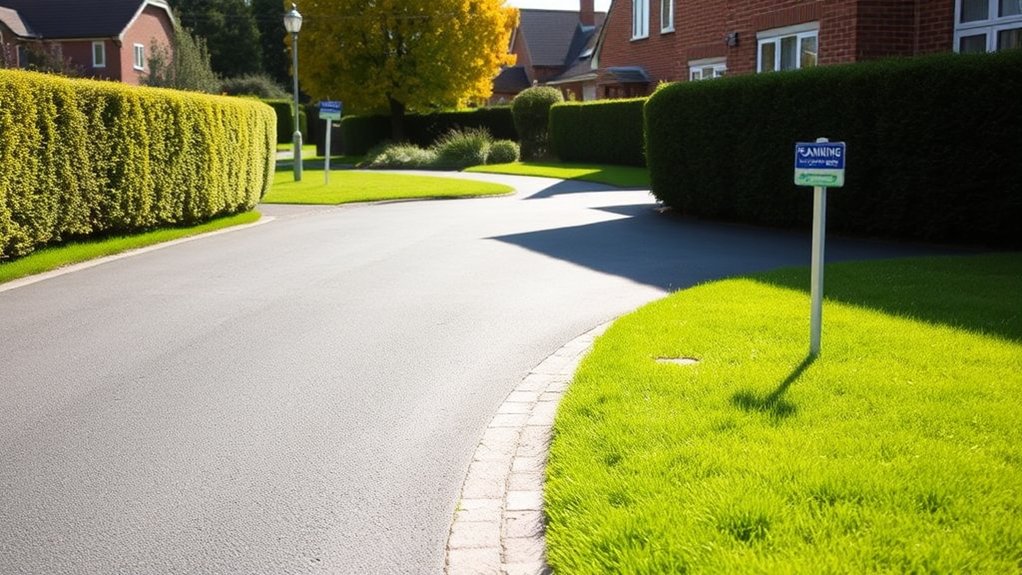
If you’re planning to extend your driveway, it’s crucial to know the planning permission requirements that may apply. Major changes, such as widening the driveway or altering access to public roads, usually require permission. If your property is in a conservation area, you may need to consider the visual impact on the neighbourhood, as local feedback can influence decisions by the council. For front gardens, using non-permeable materials over five square metres will typically need approval due to stricter regulations. However, if you choose permeable materials, you can extend your driveway without needing permission, as these help manage rainwater runoff. Always check with your local planning authority for specific definitions and guidelines, particularly concerning what constitutes the principal elevation of your home, as this can affect the outcome of your application. Obtaining planning permission is essential to ensure compliance with local regulations and to avoid potential issues in the future. Additionally, compliance with dropped kerb regulations is necessary for vehicle access to your driveway.
When Is Planning Permission Needed for New Driveways?
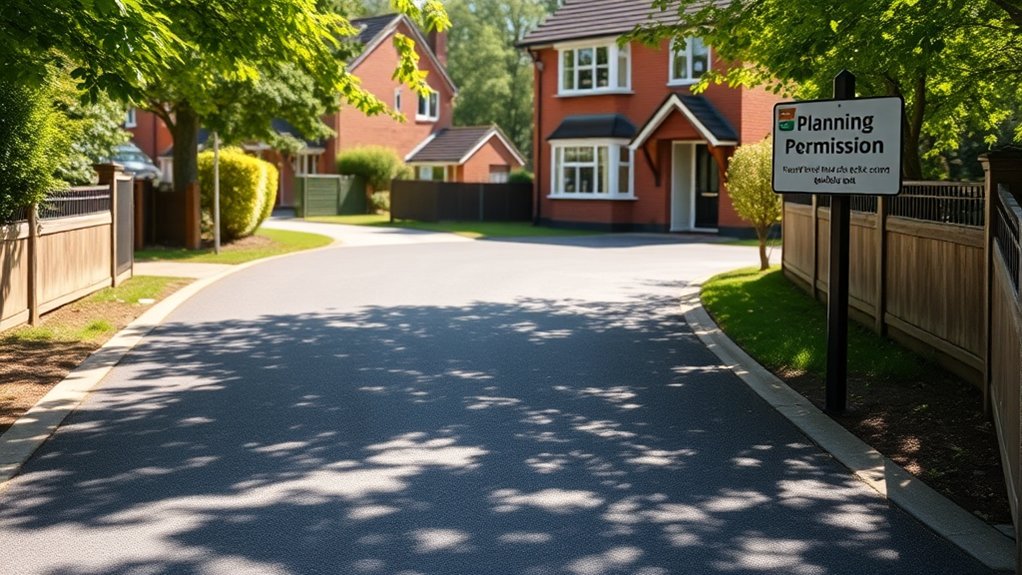
If you’re planning to build a new driveway, it’s important to know when you need planning permission.
Generally, you’ll need approval if you’re creating a new access point or if the driveway covers more than 5 square metres with an impermeable surface, such as tarmac or concrete. Additionally, ensuring that surface water drains to nearby lawns or flower borders is crucial for compliance with surface water drainage regulations.
Always check with your local council for specific requirements related to your area and project, as regulations can vary.
New Access Points
Have you thought about the effects of adding a new access point to your driveway?
If your new driveway connects to a classified road, you’ll likely need planning permission. Local authorities assess how your access point impacts traffic flow and safety, paying particular attention to visibility and the risk of collisions. Their goal is to reduce hazards and ensure smooth traffic movement on busy roads. Additionally, ensuring that your driveway complies with planning permission requirements can help avoid potential legal issues down the line.
While access to unclassified roads may not require permission, safety standards still apply. Remember, local planning authorities often prefer fewer access points on main roads to minimise disruptions.
Before moving forward, consult with your local planning authority (LPA) to understand the necessary regulations and avoid any issues. Proper planning ensures your new access point meets all required standards.
Impermeable Surface Area
If you’re thinking about extending your driveway, it’s important to grasp the rules around impermeable surface area.
You’ll need planning permission if the new impermeable surfaces cover more than five square metres. For areas of five square metres or less, permission is typically not required, but always check for local exceptions.
Consider using permeable materials like gravel or porous asphalt, which generally don’t need permission, no matter the size.
If you decide on impermeable surfaces, ensure they direct runoff to a permeable area to avoid issues with compliance. Implementing proper drainage systems can help manage water effectively and ensure adherence to local regulations.
Remember, drainage solutions such as soakaways can effectively manage water and comply with local regulations.
Always confirm the specifics with your local authority before you start.
Local Planning Authority
Understanding impermeable surfaces is key to knowing if you need planning permission for your driveway extension.
If you’re building a new driveway or changing access points from a public road, you’ll usually need approval from your local planning authority. This is particularly important if your project involves installing a dropped kerb or if your driveway exceeds five square metres of impermeable surface.
Local regulations may have stricter rules, especially if your driveway is in front of your house.
Using permeable materials can sometimes exempt you from needing permission, as they help manage surface water runoff. Planning permission is essential to ensure compliance with local regulations and maintain neighborhood character.
Always check with your local authority to ensure you comply with specific planning guidelines before starting your project.
Widening Existing Driveways: What to Consider
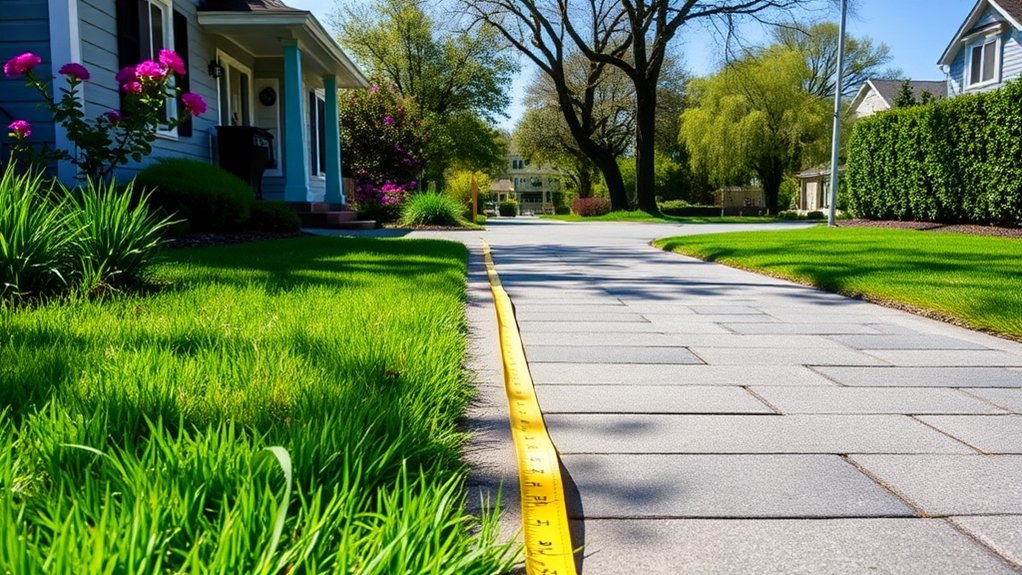
When widening your existing driveway, it’s important to consider the legal requirements for planning permission, particularly if it affects boundaries or access to public roads.
You’ll also need to choose the right surface materials; for example, opting for porous options can help with drainage and may comply better with regulations.
Additionally, think about how your project might impact your neighbours to avoid disputes and ensure you respect property boundaries.
Planning Permission Necessities
Widening an existing driveway in the UK often requires careful consideration of planning permission.
Start by checking your local driveway regulations, as these can differ significantly from one area to another. If you’re looking to create new access points or remove boundary structures, you’ll likely need permission.
Think about how your changes might affect your neighbours; alterations to fences or walls can trigger additional requirements.
While permitted development rights might apply, there are exceptions, particularly in conservation areas or for listed buildings.
Always consult your local council to clarify any planning exceptions and ensure compliance with regulations.
Engaging professionals who understand local rules can make the process smoother and help you avoid potential issues.
Surface Material Considerations
Selecting the right surface material for your driveway extension is crucial for durability, maintenance, and appearance.
If durability is your main concern, concrete and block paving are excellent choices due to their longevity, with block paving allowing for personalised designs.
Asphalt is more affordable but needs regular sealing to last, while tar and chip offers a low-cost alternative, though it comes with maintenance issues.
Gravel and permeable paving are budget-friendly and help with drainage, but they require adequate containment to stop displacement.
Ultimately, choose a material that balances visual appeal with practicality, ensuring your driveway is both functional and attractive for years to come.
Neighbor Impact Assessment
When considering widening your driveway, it’s essential to evaluate the potential impact on your neighbours and their properties. Securing neighbour consent is crucial, especially if your plans may encroach on their land. Conducting property surveys to clarify boundaries may also be necessary. Here’s a quick overview of what to consider:
| Consideration | Action Required | Potential Impact |
|---|---|---|
| Neighbour Consent | Obtain a signed agreement | Legal compliance |
| Property Survey | Hire a qualified surveyor | Confirm property lines |
| Permit Application | Submit the required documents | Prevent legal disputes |
| Zoning Regulations | Review local planning codes | Ensure compliance |
The Role of Surface Materials in Planning Permissions

When planning a driveway extension, the choice of surface material is crucial in determining whether you need planning permission. Here’s what to keep in mind:
- Permeable Materials: Options like gravel or permeable block paving typically don’t require permission as they facilitate drainage and minimise environmental impact.
- Non-Permeable Surfaces: Materials such as tarmac or concrete that cover more than 5 square metres generally require planning permission due to concerns about increased surface water runoff.
- Local Authority Policies: Many councils have stricter regulations on impermeable surfaces to manage urban runoff, making your choice of material essential for compliance.
Changes to Access Points and Dropped Kerbs
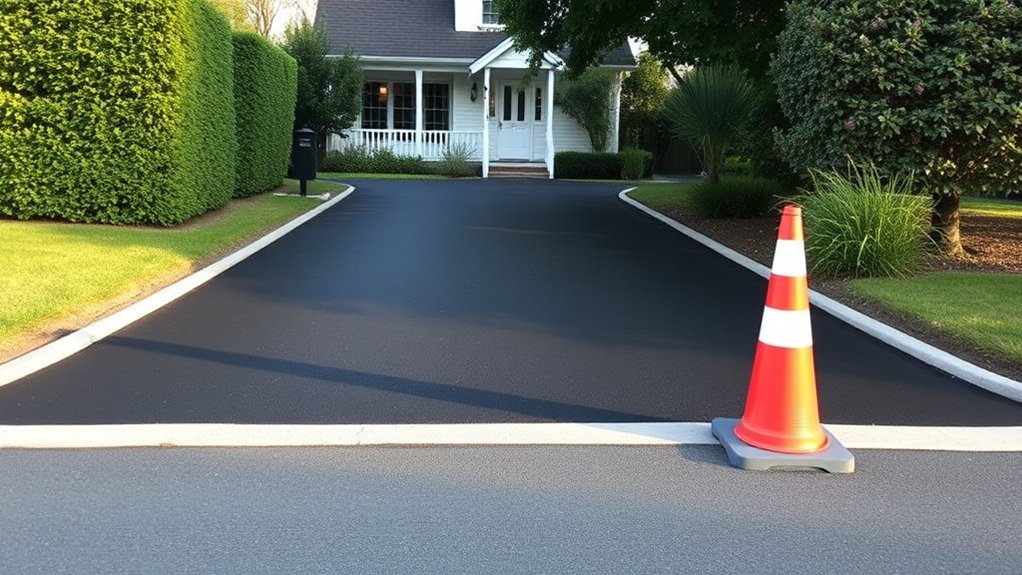
Making changes to access points and installing dropped kerbs can significantly affect your driveway extension project, so it’s essential to grasp the legal requirements.
If you’re thinking about modifying access points, you’ll usually need planning permission from your local council, especially for new entries onto public roads.
Dropped kerb regulations also require formal approval, as these changes must meet safety assessments and visibility standards.
If your modifications impact boundary walls or road safety, further permissions may be necessary. Be aware that installing a dropped kerb without permission can result in fines or enforcement actions.
Always check your local council’s policies, as requirements can vary widely.
In some cases, additional stipulations may apply, especially under Article 4 Directions in conservation areas.
Prioritising compliance will help ensure a smooth process for your driveway extension.
Special Considerations for Historic and Conservation Areas

Modifying your driveway in a historic or conservation area requires careful thought due to strict regulations aimed at preserving the character of the area.
Keep these important points in mind:
- Permitted Development Rights: In conservation areas, these rights are often limited or removed. This means you may need formal permission for even minor changes.
- Material Choices: Choose materials that respect the character of the area, such as permeable surfaces, which help maintain the aesthetic integrity.
- Principal Elevation: Be mindful of defined principal elevations. These can determine whether your driveway extension needs planning permission according to conservation guidelines.
Navigating these requirements is crucial to ensure compliance and protect your property’s unique character.
Best Practices for Ensuring Compliance
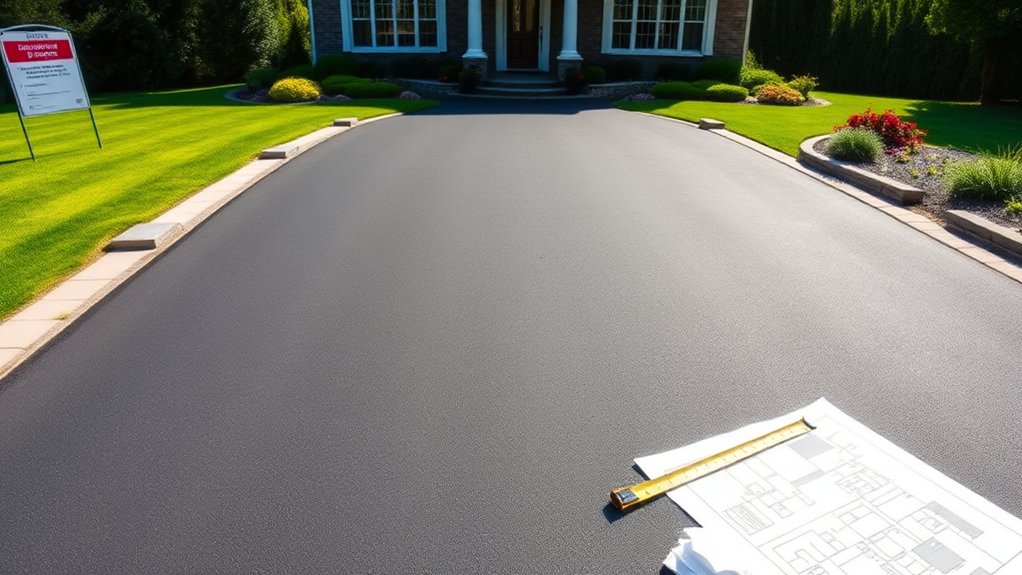
To ensure your driveway extension complies with planning regulations, it’s crucial to understand the specific requirements for your property type and location.
Begin by checking your compliance checklist to see if you need planning permission, particularly if you plan to use non-porous materials over 5m². Ensure your driveway’s design meets local aesthetic guidelines and consider how it may affect your neighbours and property boundaries.
If you’re altering access or dropping a kerb, you’ll need to consult your local highway authority.
Don’t forget to adhere to surface water drainage regulations, as poor management could lead to enforcement actions.
Lastly, always check any original planning permissions or restrictions to avoid issues later on.
Consulting Local Authorities for Guidance

Understanding local regulations is crucial when considering a driveway extension. Consulting with local authorities can provide clarity for your project.
Here are three key steps to follow:
- Contact your local planning authority to find out if you need planning permission for your driveway extension.
- Submit detailed plans and documentation to ensure you comply with regulations, particularly regarding materials and access points.
- Engage with your neighbours to gather feedback on your proposal, as their opinions can affect your chances of approval.
Frequently Asked Questions
How Long Does the Planning Permission Process Typically Take?
Planning timelines for simple applications typically take about eight weeks. For more complex cases, this can extend to 13 weeks or even longer. Local objections and requests for additional information can also cause delays. For instance, if your application is for a new extension and neighbours raise concerns, it may take longer to resolve those issues before approval is granted.
What Are the Penalties for Not Obtaining Planning Permission?
Failing to obtain planning permission can result in significant legal repercussions, including enforcement actions from local councils. You may face hefty fines, expensive remedial work, and difficulties when selling your property or applying for future development permissions. For instance, if you build an extension without permission, you could be ordered to demolish it, adding to your costs and stress.
Can I Appeal a Denied Planning Permission Request?
If your planning permission request has been denied, you can appeal the decision. Start the appeal process as soon as possible, ensuring that your submission adheres to local planning policies. This will increase your chances of a successful outcome. For example, if your application was turned down due to concerns about the impact on the local environment, addressing these specific issues in your appeal can be beneficial.
Are There Fees Associated With Applying for Planning Permission?
When you apply for planning permission, you will encounter various application costs and fee structures. These fees can differ based on the size and complexity of your project. For instance, a small extension may have a lower fee compared to a large commercial development. It’s important to factor these costs into your budget, especially for bigger projects, as they can significantly impact your overall expenses.
How Can I Find My Local Planning Authority’s Contact Information?
To find your local planning authority’s contact information, visit their official website. There, you should find phone numbers, email addresses, and physical addresses for any inquiries. For example, if you live in London, you can search for the contact details specific to your borough, such as Camden or Kensington and Chelsea. This will ensure you get the most relevant information for your planning needs.
Conclusion
In summary, navigating planning permission for a driveway extension can be tricky—one wrong move could lead to issues. It’s important to know when you need permission and consider factors like the type of materials you use and any changes to access. Always check with your local council to ensure you’re compliant. By following the right steps, you can ensure your project runs smoothly and keeps your property both practical and within legal requirements.
Know the essential steps to secure planning permission for your tarmac driveway—discover key insights that could save you time and Read more
Learn about driveway width regulations and discover the essential requirements that could affect your property—find out how wide your driveway Read more
Comprehend the essential UK driveway regulations to ensure compliance and discover key factors that could impact your project and budget. Read more


